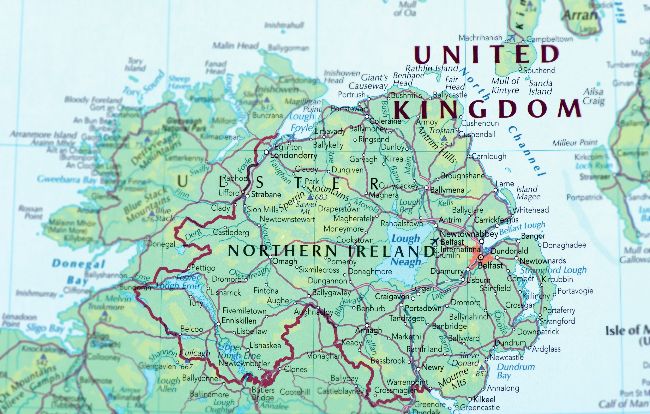NEW DATA REQUIREMENTS
At the heart of the Windsor Framework is a requirement to provide more detailed information when dispatching goods from GB to NI. While the process is being facilitated through Parcelforce’s WDM online shipping system, it now demands several additional data points that RFDs were not previously required to submit.
“In WDM,” explained Paul, “the old system already included basics like addresses, firearm types, packaging, and insurance. But now, when you enter a Northern Ireland postcode, a new box appears that prompts you to confirm the parcel is being sent from GB to NI. From there, you must input your EORI number and the recipient’s EORI number.”
EORI (Economic Operators Registration and Identification) numbers are essential for customs processing. For most UK RFDs, this means contacting the receiving RFD in Northern Ireland and requesting not only a copy of their firearms certificate, but also their EORI number, an additional step that may take time to integrate into existing routines.
Other information that must now be entered includes the weight and value of the item, its country of origin and its classification using a commodity or tariff code. If RFDs do not use a UKIMS number (which is optional), they must enter a correct tariff code, such as “93033000” for rifles, along with a short description (e.g., “rifle” or “shotgun”). This code ensures customs authorities can accurately identify and process the shipment.
PRACTICAL IMPACT ON DEALERS
For most dealers, the new process will only require some initial familiarisation. “Once you’ve done it once, it’s quite straightforward,” Paul said. “You can set up a little spreadsheet with your EORI number and the relevant commodity codes, then just copy them in each time.”
WDM also includes a save function that allows users to store recurring data for future shipments, something Paul noted would prove useful once dealers have their regular contacts and codes organised.
However, Paul acknowledged the system can be intimidating at first. “A lot of RFDs, myself included, only send to Northern Ireland two or three times a year. I looked at it and thought, ‘Do you know what? It’s not worth the hassle,’ and I know I wasn’t alone. Some dealers have simply stopped shipping to Northern Ireland altogether, which is already being felt by businesses over there.” GTA support and guidance
To help the trade adjust, the GTA is preparing a formal guidance document. “I’m currently writing up a support document,” Paul confirmed. “It will be verified with Parcelforce and then we’ll decide on the best way to format and distribute it. Initially, I’ve prepared it as a presentation, but that can be adapted into a formal guide.”
This document will be focused solely on B2B and RFD-to-RFD shipments, filtering out irrelevant details from the broader guidance Parcelforce issued, which also covered business-to-consumer and private-to-business shipments. “As RFDs, we do not send firearms directly to private individuals, so our focus is quite specific,” Paul added.
CONSEQUENCES OF NON-COMPLIANCE
While there is no formal enforcement regime currently in place, there are real-world consequences for failing to follow the process. “If you put in the wrong EORI number or the wrong commodity code, or if you don’t put the data in at all, the parcel may be delayed or even returned,” Paul said.
In such cases, the sender bears the cost and inconvenience. “There’s no threat of seizure or destruction, but you’re looking at unnecessary delays and extra charges. Firearms could be stuck in the system for 48 hours or more, which creates knock-on effects for dealers and customers alike.”
WILL TRADE BE DISRUPTED?
Paul acknowledged that some friction in the system is inevitable. “It’s an extra workload, plain and simple. There’s more communication involved, more data entry and more room for error. But once you know what you’re doing, it’s manageable.”
He encouraged RFDs to be proactive and start compiling the necessary information now, especially their EORI numbers and those of any dealers in Northern Ireland they trade with. “The key is to get your house in order early. Once you’ve got your templates and contacts in place, you’re good to go.”
WAS THE TRADE CONSULTED?
While the Home Office has not been directly involved in implementation, Parcelforce has made some effort to inform account holders. “They did send out a series of emails,” Paul recalled. “The first one was vague and understandably caused confusion. A second, more detailed email followed, but it covered all use cases, not just firearms. That’s why we’re developing GTA-specific guidance, to strip out the noise and focus on what matters to our sector.”

IMAGE: ISTOCK - OMERSUKRUGOKSU
NEXT STEPS
In the meantime, RFDs should prepare by:
• Ensuring they have an EORI number (available from HMRC)
• Requesting EORI numbers from their Northern Ireland contacts
• Familiarising themselves with the WDM system updates
• Recording relevant tariff codes for rifles, shotguns, parts and accessories
• Watching for GTA’s formal guidance in the coming weeks
Paul’s advice is clear: “Don’t panic. Yes, it’s an extra process, but it’s not unmanageable. Once you’re set up, it becomes part of your normal workflow.”
As always, the GTA will continue to work with both industry and service providers to make compliance as smooth as possible for RFDs across the UK.
GET IN TOUCH
T: 01684 291868
E: office@gtaltd.co.uk
W: www.gtaltd.co.uk